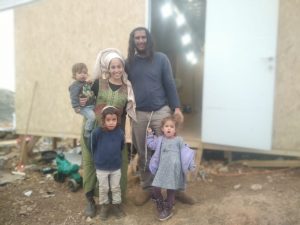For a partial list of cases in which Honenu has represented Neriya Zarog, please see here.
Honenu has represented numerous detainees who have filed complaints with, and in some cases sued, the Israel Police for illegal strip searches. Please see here for a sampling of cases.
Thursday, December 30, 2021, 8:45 The Prison Service will compensate Geulat Tzion resident Neriya Zarog, a married father of three children, for an illegal strip search. Initially the Prison Service claimed that no strip search had been conducted because there was no record of it. However, in a plea bargain they agreed to pay compensation.
Honenu Attorney Menashe Yado, who is representing Zarog: “The defendant (the Prison Service) claimed that there had not been a full body strip search because every full body strip search is recorded in the log, and the fact that there is no such record of that incident refutes the claim by the plaintiff, according to which there was a full body strip search. Despite that, the defendant paid a not insignificant sum in a compromise agreement, which indicates that the defendant does not believe their own claim. The payment is an admission of yet another completely unnecessary full body strip search of a man who was suddenly detained from his bed and in a manner which in and of itself was sufficient to rule out any grounds that would justify the humiliation of a full body strip search.”
The incident occurred approximately two and half years ago. Zarog was detained in his home at 4:30 in the morning and taken to the detention center at the Russian Compound in Jerusalem, where despite his firm refusal to undergo the search, he was not granted a hearing as is required by law. After he was illegally threatened with the use of force, he underwent a full body strip search.
The statement of claim that Yado filed on behalf of Zarog explains that, “the threat was illegal because there had not been a hearing as required by law. And in the absence of a hearing, there is no authority to conduct a full body strip search. Moreover, the search was illegal because there was no necessity or need sufficient to justify a full body strip search.”
According to the statement of claim, there were no grounds for assuming that he had among his possessions objects associated with criminal use. Additionally, Zarog underwent a partial strip search and passed a metal detector at the police station. From the time of that search until the full body strip search he was under constant surveillance by policemen and/or prison guards, so he had no practical opportunity to acquire any object whatsoever. Also, a man detained with Zarog was not forced to undergo a full body strip search.
Zarog added that the authority to conduct full body strip searches must be exercised in a limited and measured way, because if he had been granted a hearing, as is required by law, the officer should have come to the conclusion that there was insufficient justification for a full body strip search. The failure to grant him a hearing constitutes an injustice in and of itself, and creates an evidentiary doubt, placing an obligation on the Prison Service to prove that they had not been negligent.
In mid-November, Zarog’s house was destroyed twice within a week when security forces removed families from Geulat Tzion and Ramat Migron, both hilltop communities in the Binyamin region, and destroyed their houses.

